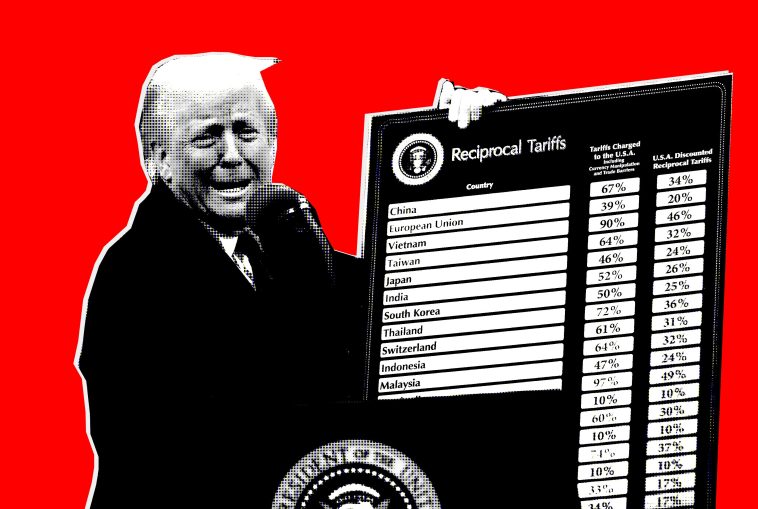There are situations in which tariffs are a useful tool to address a trade deficit, or to protect key sectors of a country’s economy. Then there are situations where you accuse a bunch of penguins on an uninhabited island of currency manipulation. Guess which one we’re living in?
This is the takeaway of the manifold tariffs announced by President Donald Trump on Wednesday afternoon. In addition to the penguin-occupied Heard and McDonald Islands, the tariffs target the British Indian Ocean Territory, whose sole occupants live on a joint US-UK military base on Diego Garcia island. Yes, the United States is levying reciprocal tariffs against its own troops.
And then there are the tariffs against countries that have actual goods and services on which US consumers depend. China: 54 percent. Vietnam: 46 percent. Cambodia: 49 percent. South Korea: 25 percent. No corner of the US consumer economy will go untouched. Prices will rise. The stock market is spiraling. A recession looms. The tech industry will be turned upside down. Mark Cuban, noted billionaire, is encouraging people to stockpile consumables before it’s too late.
It’s reckless, it’s absurd, and it’s also everything Donald Trump said plainly he would do on the campaign trail. True, he didn’t telegraph how misguided the methodology would be—you can read about it more here, but suffice to say it’s thoroughly detached from the realities of international trade—but he loudly, repeatedly promised to tariff his way to glory.
The stated goal is to return manufacturing jobs to the United States, which is a bit like resurrecting the dodo. The US still manufactures plenty of goods; it’s second only to China in annual output, according to the World Bank. But many of the industry’s jobs have been replaced by automation, a bottle you can’t re-cork. And higher domestic labor costs mean US-made products will inherently be more expensive, a trade-off American consumers have consistently rejected. All of this was already true in Trump’s first term. It’s even more so now.
And let’s say a plurality of companies did decide to reshore or set up factories in the United States. The timeline for those decisions and implementation is measured in years, if not decades, and follow-through can be spotty. (Just ask Foxconn.) So what happens in the meantime?
The rationale has all the weight of a soap bubble. There isn’t a world where the US suddenly manufactures all the items the country has decided to target. There’s a 47 percent tariff on Madagascar now. Do you know why the US has a trade deficit with Madagascar? They produce vanilla; we don’t. Unless we’re suddenly setting up vanilla assembly lines in Ohio, that’s not changing.
But maybe Trump’s so-called Liberation Day is all just a master negotiating ploy. “Everybody sit back, take a deep breath. Don’t immediately retaliate. Let’s see where this goes,” said Treasury secretary Scott Bessent on CNN Wednesday. “Because if you retaliate, that’s how we get escalation.”
It’s an interesting tactic, to start a bar brawl and ask everyone not to punch back in case someone gets hurt. It’s not working. China has already vowed to retaliate; the EU suggested that it could as well. (New Zealand is officially chill.)
Set the economics of this aside for a moment, though. The insult on top of that looming injury is how sloppy this all is. It’s the same blunt-force destruction that DOGE has implemented within the US government, that Robert F. Kennedy Jr. has imposed on the Centers for Disease Control and Prevention, now projected on a global scale. Yes, Elon Musk and DOGE have taken a blowtorch to federal agencies. But the tariffs are a helpful reminder that it’s Trump who’s fiddling while it all burns.
It’s the instinct to measure wins in units of pain and suffering. It’s an assumption that the only way to help yourself is to hurt other people. This is just what America is now.
The optimist’s case is that this is all a feint, that other countries will capitulate or at least make enough of a show of it that things will go back to normal. Seems unlikely. First of all, they’re already doing the opposite, all apologies to Bessent. But even if they weren’t, even if this is just posturing from the US, that posturing has consequences. Whatever equity the US has built up over the last century as a reputable trade partner has been largely wiped out by a businessman-president best known for his bankruptcies.
And then there’s the pessimist’s case, which also seems increasingly like the realist’s. The US is barreling toward a recession for no good reason, and dragging the world—and a few thousand penguins on remote Antarctic islands—down with it.
The ChatroomWill these tariffs lead to a US manufacturing renaissance, or a prolonged recession?
Leave a comment on the site or send your thoughts to [email protected].
WIRED ReadsThe CDC Has Been Gutted: Thousands of CDC employees who worked on things like preventing HIV and lead poisoning have been told they were subject to a reduction in force. Experts say people will die.The DOGE Axe Comes for Libraries and Museums: The Institute of Museum and Library Services has long received bipartisan support. But after years of trying, President Donald Trump has delivered it a crushing blow.Federal Judge Allows DOGE to Take Over a $500 Million Building for Free: It’s the culmination of a weeks-long standoff between Elon Musk’s DOGE team and the United States Institute of Peace.Want more? Subscribe now for unlimited access to WIRED.
What Else We’re Reading🔗 Trump Tells Inner Circle That Musk Will Leave Soon: Elon Musk increasingly feels more like a liability than an asset to the Trump administration. Still, we’ll believe this when we see it. (Politico)
🔗 DOGE Official at DOJ Bragged About Hacking, Distributing Pirated Software: A dive into the checkered online past of a SpaceX engineer now working in the Deputy Attorney General’s Office. (Reuters)
🔗 Fired Health Workers Were Told to Contact an Employee. She’s Dead: Some reduction-in-force notices told people to contact a woman named Anita Pinder with discrimination complaints. Pinder died last year. (The Washington Post)
The DownloadWIRED business director Zoë Schiffer and senior politics editor Leah Feiger joined Shumita Basu last week on the Apple News in Conversation podcast to talk about our big DOGE feature. Listen now.
Thanks again for subscribing. You can find me on Bluesky or on Signal at barrett.64.
This is an edition of the WIRED Politics Lab newsletter. Read previous newsletters here.





GIPHY App Key not set. Please check settings